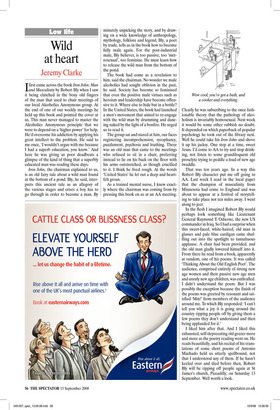Wild at heart
Jeremy Clarke
Ifirst came across the book Iron John: Man and Masculinity by Robert Bly when I saw it being clutched in the bony old fingers of the man that used to chair meetings of our local Alcoholics Anonymous group. At the end of one of our weekly meetings he held up this book and pointed the cover at us. This man never managed to master the Alcoholics Anonymous principle that we were to depend on a ‘higher power’ for help. He’d overcome his addiction by applying his great intellect to the problem. He said to me once, ‘I wouldn’t argue with me because I had a superb education, you know.’ And here he was giving us poor deadbeats a glimpse of the kind of thing that a superbly educated man was reading these days.
Iron John, the chairman explained to us, is an old fairy tale about a wild man found at the bottom of a pond. Bly, he said, interprets this ancient tale as an allegory of the various stages and crises a boy has to go through in order to become a man. By minutely unpicking the story, and by drawing on a wide knowledge of anthropology, mythology, folklore and legend, Bly, a poet by trade, tells us in the book how to become fully male again. For the post-industrial male, Bly believes, is too passive, too ‘metrosexual’, too feminine. He must learn how to release the wild man from the bottom of the pond.
The book had come as a revelation to him, said the chairman. No wonder we male alcoholics had sought oblivion in the past, he said. Society has become so feminised that even the positive male virtues such as heroism and leadership have become offensive to it. Where else to hide but in a bottle? In the United States, the book had launched a men’s movement that aimed to re-engage with the wild man by drumming and dancing naked by the light of a bonfire. He urged us to read it.
The group sat and stared at him, our faces registering incomprehension, sycophancy, puzzlement, psychosis and loathing. There was an old man that came to the meetings who refused to sit in a chair, preferring instead to lie on his back on the floor with his arms outstretched, as though crucified to it. I think he lived rough. At the words ‘United States’ he let out a deep and heartfelt groan.
As a trained mental nurse, I knew exactly where the chairman was coming from by pressing this book on us at an AA meeting. Clearly he was subscribing to the once fashionable theory that the pathology of alcoholism is invariably homosexual. Next week it would be some other rubbish no doubt. It depended on which paperback of popular psychology he took out of the library next. Well he could take his Iron John and shove it up his jacksy. One step at a time, sweet Jesus. I’d come to AA to try and stop drinking, not listen to some grandiloquent old proselyte trying to peddle a load of new age twaddle.
That was ten years ago. In a way this Robert Bly character put me off going to AA. Last week I read in the local paper that the champion of masculinity from Minnesota had come to England and was about to appear at a festival of storytelling to take place not ten miles away. I went along to jeer.
In the flesh I imagined Robert Bly would perhaps look something like Lieutenant General Raymond T. Odierno, the new US commander in Iraq. So I had a surprise when this sweet-faced, white-haired, old man in glasses and pale blue cardigan came shuffling out into the spotlight to tumultuous applause. A chair had been provided, and the old man gladly lowered himself into it. From there he read from a book, apparently at random, one of his poems. It was called ‘Thinking About the Old English Poet’. The audience, comprised entirely of strong new age women and their passive new age men and unruly new age children, was enthralled. I didn’t understand the poem. But I was possibly the exception because the finish of the poems was greeted by resonant and satisfied ‘Mm!’ from members of the audience around me. To which Bly responded: ‘I can’t tell you what a joy it is going around the country ripping people off by giving them a few poems they don’t understand and then being applauded for it.’ I liked him after that. And I liked this exhausted, self-deprecating old geezer more and more as the poetry reading went on. He reads beautifully, and his recital of his translations of some short poems of Antonio Machado held us utterly spellbound, not that I understood any of them. If he hasn’t keeled over and died before then, Robert Bly will be ripping off people again at St James’s church, Piccadilly, on Saturday 13 September. Well worth a look.










































































 Previous page
Previous page